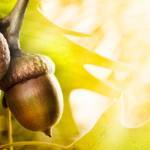Acorn Poisoning Kills Horses

Consumption of acorns is thought to have caused the deaths of ten French horses in the fall of 2013, according to the veterinarian who examined the animals. The horses showed bloody diarrhea and signs of colic shortly before they died, and all were reported to have eaten acorns after a severe storm scattered acorns in pastures.
Tannin is thought to be the toxin in these cases. Tannin is found in the acorns, bark, and leaves of oak trees, and while the level varies among different oak species, consumption of any amount of oak parts should be avoided in horses and cattle. For a horse of average weight, consumption of less than seven pounds (3.2 kg) of acorns could be fatal. As is the case for some other poisonous plant parts, horses usually won’t eat acorns, which have a bitter taste, if other forage is available.
To prevent acorn poisoning, owners should avoid pasturing horses in fields that contain, or are closely bordered by, oak trees. Fencing around oak trees so that fallen acorns can’t be eaten by horses is another solution. Horses should always have access to enough grass or hay so that hunger will not force them to eat plants they would normally avoid.








